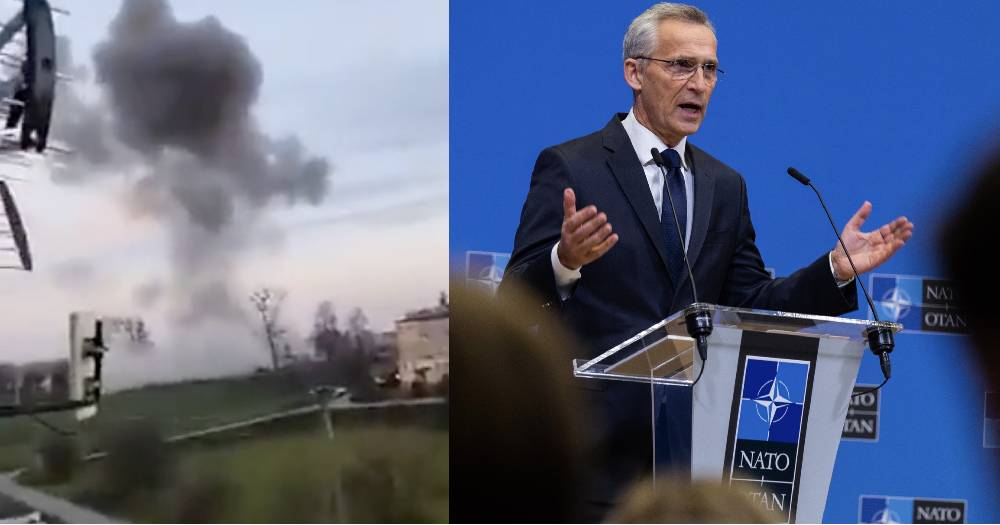Follow us on Telegram for the latest updates: https://t.me/mothershipsg
The missile which struck Polish territory on Nov. 16 and resulted in two casualties is supposedly of Ukrainian origin.
"Unlikely" to be fired by Russia
On Nov. 16, U.S. President Joe Biden claimed that the missile was "unlikely" to have been fired from Russia, and told G7 and the North Atlantic Treaty Organisation (NATO) that the projectile was a stray Ukrainian air defence missile, Reuters reported.
Previously, the Russian Defence Ministry had denied their involvement in the blast, adamantly denying that they struck targets near Poland.
Polish President Andrzej Duda also told a press conference on Nov. 16 that there was a “high chance” it was an air defense missile from the Ukrainian side, and that it had likely fallen in Poland in “an accident” while intercepting incoming Russian missiles.
The missile was identified to be a Russian-made S-300 rocket, which was used by both Ukrainian and Russian forces during the conflict.
NATO allies met in Brussels on Nov. 16 to address the explosions in Poland. In a press conference by NATO Secretary General Jens Stoltenberg which occured after the meeting, he stated that there was "no indication that Russia is preparing offensive military actions against NATO."
However, he concurred that majority of the blame lies in Russian hands.
"But let me clear, this is not Ukraine's fault. Russia bears ultimate responsibility as it continues its illegal war against Ukraine," he said during their press conference.
Overshadowed G20 agenda
The issue of Ukraine overshadowed the G20 (Group of 20) Summit from its very beginning.
On Tuesday (Nov. 15), the G20 nations drafted a joint statement condemning the Russian invasion of Ukraine, saying that "today's era must not be one of war."
The statement, which was issued by the White House on Nov. 16, stressed that the conflict adversely impacted the global economy and exacerbated human suffering, posing numerous threats to global security and stability as a whole.
The statement explicitly states that the G20 members "deplores in the strongest terms the aggression by the Russian Federation against Ukraine".
In response, Russian representative and foreign minister Sergey Lavrov accused the G20 of "politicising " the discussion at the summit, adding that his western counterparts turned the event into an "anti-Russian" platform.
Before the statement could be released, he left the conference to allegedly receive a health checkup.
In the wake of the missile attack on Poland, Biden convened an emergency meeting in the evening with some world leaders to discuss the matter on the sidelines of the G20 summit.
According to U.S. officials, initial findings suggested that the missile that hit Poland was fired by Ukrainian forces at an incoming Russian missile.
The investigations of Polish authorities ultimately corroborated with Biden's statement, concluding that the missiles were likely fired by Ukraine in defence, but accidentally landed in Polish territory.
Shifting blame
According to CNN, Ukrainian President Volodymyr Zelensky told reporters in Kyiv that he had "no doubt" that the missiles were not Ukrainian, pointing the blame towards Russia.
On the contrary, Kremlin spokesperson Dmitry Peskov said that Russia doesn’t have “any relation” with the missile incident in Poland, and that some leaders have made statements without understanding “what actually happened” and without "any real evidence".
He labelled the Western response as a "hyterical frenzied Russophobic reaction".
Nevertheless, the U.S. concluded, as seen in a statement by the White House, that Russia is ultimately to blame for engaging in conflict in the first place, and that Ukraine had "every right to defend itself".
The G20's statement regarding this issue is similarly vague, choosing to focus and specifically condemn the 85 missiles which were launched at Ukraine on Nov. 15. The missiles targetted energy infrastructure.
Most leaders present at the G20 condemned Russia's war in Ukraine, but some acknowledged that others saw the conflict differently.
If you like what you read, follow us on Facebook, Instagram, Twitter and Telegram to get the latest updates.
